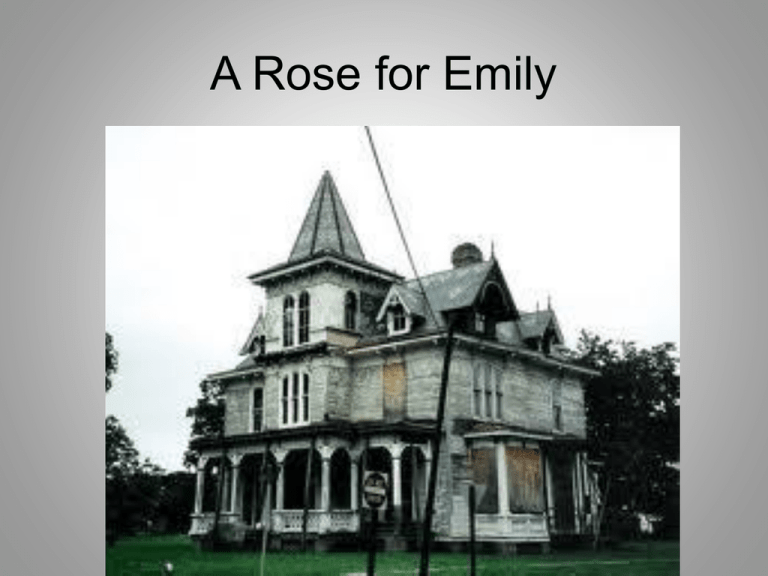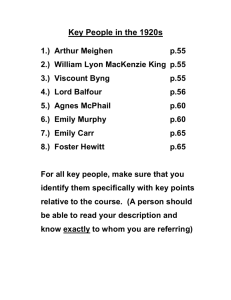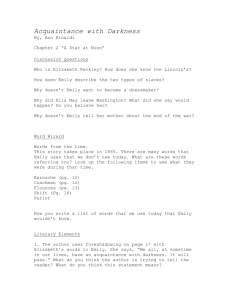
A Rose for Emily
Emily
• Your classic outsider. Emily isolates herself from the
community so that she limits the access the community
has to her true identity by remaining hidden.
– Miss Emily is an old-school southern belle trapped in a society
bent on forcing her to stay in her role. She clings to the old
ways even as she tries to break free. When she's not even
forty, she's on a road that involves dying alone in a seemingly
haunted house. At thirty-something she is already a murderer,
which only adds to her outcast status. Miss Emily is a truly
tragic figure, but one who we only see from the outside.
• Object of scrutiny from the townspeople.
• Behaviour is bizzare, eccentric, tragic.
Emily
• A law unto herself.
• A known figure. Respected?
• Abandoned.
• Compared to a monument- why?
Emily
• Artist: We don't know for sure if Emily's artistic ability extended
beyond china-painting.
• Even though we don't know the full extent of Emily's art, thinking
of her as an artist helps us to see the tragedy of her life, and also
provides us a bit of a hopeful angle of vision.
• On the tragic side, we see that while Emily's art was at first a link to
the town, a way to be a member of the community and to have
some contact with the outside world.
• Once the "newer generation" pieced together her secret, even this
last link was gone.
Emily
• Daughter: but where is her mother? Why isn’t
she mentioned?
– The town sees Emily as her Father’s daughter.
– Emphasises the control that Mr Grierson had over
his daughter and her life. He kept her isolated.
– Why didn’t she just leave?
Emily
• The bare sketch we have of her father shows a man who
was unusually controlling, domineering, and perhaps
capable of deep cruelty, even toward his only daughter.
• This theory also disguises her behaviour after his death,
when she tried desperately to shed the image of dutiful
daughter, and, probably for the first time, at thirtysomething, pursued her own desires for love and
sex. When this attempt at womanhood failed miserably,
she reverted back to the life her father created for her – a
lonely, loveless, isolated life.
• Except now, with Homer Barron rotting away upstairs,
there are two men that haunt her.
Emily
• Necrophiliac: Necrophilia typically means a sexual
attraction to dead bodies. In a broader sense, the term also
describes a powerful desire to control another, usually in
the context of a romantic or deeply personal relationship.
• Necrophiliacs tend to be so controlling in their
relationships that they ultimately resort to bonding with
unresponsive entities with no resistance or will—in other
words, with dead bodies.
• Mr. Grierson controlled Emily, and after his death, Emily
temporarily controls him by refusing to give up his dead
body.
• Unable to find a traditional way to express her desire to
possess Homer, Emily takes his life to achieve total power
over him.
Similarities with ‘The House of Usher’
• The house represents the
mind of the character that
inhabits it: shuttered, dusty
and dark- full of secrets.
• Emily is the last GriersonRoderick and Madeline are the
last Ushers
• Emily wishes to keep the
bodies of her loved ones
nearby. Usher wants to keep
Madeline’s body away from
the doctors in the vault.





